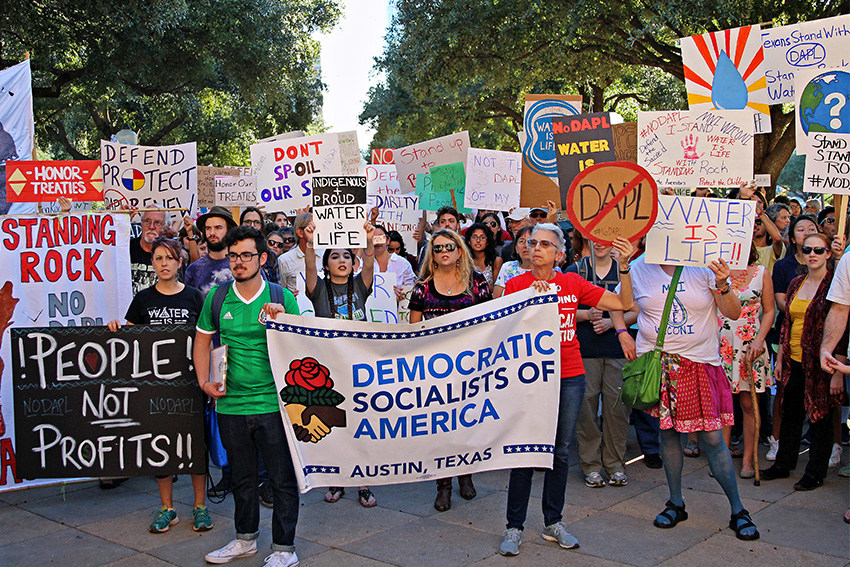Protesters marched past the Texas State Capitol Tuesday evening, chanting, “We will stand. We will fight. Water is a human right,” in an effort to call out companies such as Chase Bank and Wells Fargo for their investment with the Dakota Access pipeline in Standing Rock, North Dakota.
Native Americans and supporters have been protesting in North Dakota since July 2016, saying the new oil pipeline will run through sacred Native American land and contaminate the drinking water for the Standing Rock Sioux tribe that live in the Standing Rock Reservation. Since the protests began, more than 470 people have been arrested, according to the Associated Press.
The Austin protest was organized through Facebook, with close to 6,000 people invited to the event and over 1,000 saying they would attend. Social work graduate student Sheryl Lo said she attended the march because it is important to speak up for marginalized groups around the country.
“A lot of people have this idea about America having certain values, and if we’re not able to put that to practice, what does that mean?” Lo said. “I think it’s important that we do regard other people in other parts of the country as a part of our community, and make sure everybody does get represented in the United States.”
Social work graduate student Stephanie Thorne is in a social justice class with Lo and said she considers the pipeline to be a question of social justice.
“There’s a lot of problems with taking away this land to use for a pipeline that will cause environmental problems,” Thorne said. “The reason why the pipeline is planned to go through Standing Rock is because other places did not want to have this pipeline going through their living places.”
ABC News reported in October that Energy Transfer, the Texas-based company building the pipeline, stopped building in September as a result of a joint statement from the Department of Justice, the Department of the Army and the Department of the Interior requesting they voluntarily cease construction near Lake Oahe until further assessments could be made. On Tuesday, Energy Transfer filed a request asking to resume construction of the pipeline.
Morton Payne, international relations, global studies and French sophomore, said it’s vital that people show their opposition to corporations, such as Chase Bank and Wells Fargo, who ignore Native American rights.
“There have been a lot of people trying to use their power and money to get around people’s rights and get around the environment, and I think it’s important to show that we’re not for this,” Payne said. “It’s important to stand together and show your support for other groups, because otherwise, if only the people who are directly affected by it care, there’s not going to be a huge impact.”
Cema Tork, international relations and global studies and German senior, said that, having studied Native American history in class, she stands behind their continuing struggle.
“It’s sad to see that still today, so many rights are being taken away from Native Americans,” Tork said. “It’s really helpful to have people who aren’t Native Americans standing with them, so that there can be a greater impact.”
Journalism junior Maleeha Syed said people must support the Native Americans at Standing Rock, particularly after marginalized groups were affected by the election of President-elect Donald Trump.
“When we see everything that’s happening in light of last week with the election, a lot of groups are feeling affected … it’s important to show that just because the government is trying to take away your rights, they won’t be taken away,” Syed said. “We’ll stand with you.”





















